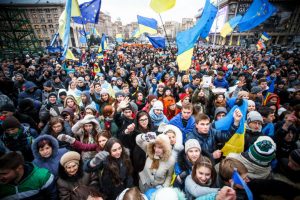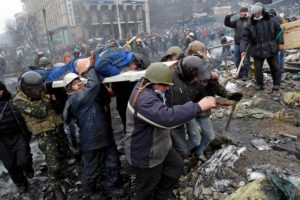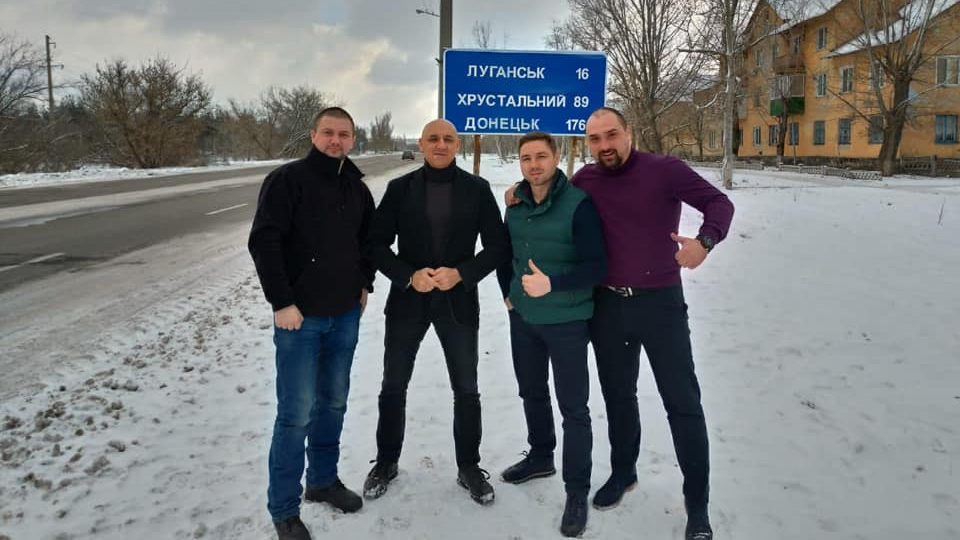
Among the many controversial aspects of the exchange, the release of the Berkut officers was probably the most contentious. Criticism focused on two polar narratives: the process of the release and whether it was legal at all; and whether the episode was directed by the Kremlin to satisfy the desire for revenge of Ukraine's pre-Euromaidan authorities and to divide Ukrainian society. The two positions dominated every public exchange of information for days. One position called for the release of Ukrainians held in captivity by the so-called “people republics” of Luhansk and Donetsk at any price. The other held that those responsible for the Euromaidan massacre must face justice -- or at the very least detained until a verdict was decreed.

Ultimately, this means that one of the worst crimes in Ukraine -- one that has resonated most with the populace, may never be solved. Despite the fact that both positions support the return of Ukrainian prisoners, the polemic itself caused a major rift. When the inclusion of the Berkut officers in the exchange was considered, few doubts remained that the officers would soon leave Ukraine.
The relatives of those killed during the Euromaidan Revolution -- represented by the Advocacy Advisory Panel and prosecutors who had worked on the case for years -- protested the straightforward release of the Berkut officers. The day before the exchange, Prosecutor General Ruslan Riaboshapka decided to replace these prosecutors with others that could be “trusted.” This revamped court, unsurprisingly, agreed to release the Berkut officers on their own recognizance, allowing them to participate in the exchange.
“We would like to apologize to the victims and the court, and to say in this situation that we feel embarrassed for this all,” one of the prosecutors from the initial group said when leaving the court hearing.

The judges in this case provided more of a ceremonial role, without any real clout. It was clear the decision on the release had already been made, likely by forces at the top executive level in Ukraine. The Berkut officers were released without a verdict.
The five Berkut officers were exchanged on 29 December 2019. At the end of January 2020, Riaboshapka reassigned the previous group of (unloyal) prosecutors back to the case. In February 2020, the two Berkut officers returned to Ukraine releasing their statement.
The Berkut officers broadcast Russia's version of events
On 8 February 2020, the Berkut officers' lawyer Oleksiy Horoshynskyi published the appeal Oleksandr Marynchenko and Serhyi Tamtura to President Volodymyr Zelenskyy, Speaker of Parliament Dmytro Razumkov, and Prosecutor General Ruslan Riaboshapka, on his Facebook page.
In it, the two Berkut officers denied their involvement in killing the Maidan protesters, announcing that they appointed guilty by the "political regime which came to power via an armed coup in 2014," claiming that Ukraine's government had used their incarceration to "hide the real organizers of the law enforcers and protesters in the February of 2014."
They called on the high-profile government officials “to cancel the law on the Maidan protesters amnesty, to provide fair and unprejudiced investigation” promising to take part in the court hearings.
In October 2019, the court changed the pre-trial detention measures imposed upon Tamtura. He was sentenced to overnight house arrest, and Marynchenko was sentenced to 24-hour arrest on 19 December 2019.
The officers’ statement says that the court replaced the pre-trial detention measure from remand in custody to house arrest because “the prosecutors did not prove the validity of the suspicion of intentional homicide and attempted murder.” This is an outright lie; in fact, the judge actually stated only that the preventive measures, in the form of 24-hour house arrest, seemed “appropriate.”
The two also explained that they agreed to the exchange in the manner outlined in the Normandy agreements because, if they refused, the exchange would be jeopardized. As well, the statement says they want to draw the attention of Ukraine's public and authorities to an "objective assessment of the events of 2014." "This was a coup d'etat. And a part of the protesters was not peaceful - they were armed criminals. They threw stones at the law enforcers, tortured them, burned them with Molotov cocktails, shot at them with firearms!", the officers claimed, stating that the law on amnesty for participants of the events of Euromaidan was adopted "to hide the truth from the Ukrainian people" and that "truth about Euromaidan" is the reason they returned to Kyiv, intending to continue participating in court hearings.
After the return of the officers to Ukraine, Riaboshapka insisted that they remain defendants,
“The case is in trial now, and, accordingly, the people who were exchanged and returned, remain defendants as before. Their procedural status has not changed,” the chief state prosecutor stated.
The Prosecutor General added that the hearings on the case will take place on 17 March,
"If they come to court, there will be no reason to change their preventive measures. If they do not, we will react differently then.”
Russia has many reasons to cast a shadow on Euromaidan. First of all, demonizing the Euromaidan revolution safeguards the Russians from ever trying something as audacious as rising up against a corrupt government. Second, portraying a public protest against the pro-Russian steps of the Ukrainian government and the ensuing political changes in Ukraine as illegitimate casts a shadow on Ukraine's pro-western choice, allowing Russia to claim that the "brotherly relations" with a country it wants in its zone of influence were fouled by foreign influence.
The investigation into the Maidan shooting is still not finished. Most accused Berkut officers escaping to Russia where they were spotted dispersing Russian protests, and the remaining five exchanged for Ukrainian prisoners held in the Russian separatist "republics" on the eve of New Year 2020. The investigation is going on for so long, partly because of the painstaking difficulty of reconstructing the chaotic events of those winter days, partly because of government obstruction and unreformed courts. Nevertheless, the Advocacy Advisory Panel, a coalition of lawyers overseeing the investigation into the massacre, says that justice has a chance, claiming that the trial into the Berkut officers “unprecedented for Ukraine, both in terms of its complexity and quality.”
And so far, the results of the investigation don't look anything like what Russia wants to you believe. The facts are that Yanukovych gave the shooting orders to the Berkut riot police and that most shootings were carried out by Berkut's "Black Company." As well, first and foremost, the Euromaidan could not be a "coup" simply because of the fact that the parliamentary and presidential elections that followed it were free and fair, resulting in a democratically elected government. The "Euromaidan coup d'etat" narrative has been repeatedly disproven by fact-checking organizations worldwide.
Families of slain protesters are outraged
The families represented by the NGO group, Families of the Heavenly Hundred Heroes, also released their appeal to Zelenskyy regarding the return. In it, they expressed outrage because of the obvious desire for revenge by the former Yanukovych “dictatorship” officials that had become ever more strident.
"The officials of the [runaway president] Viktor Yanukovych regime are boasting with impunity, openly issuing threats against the Maidan activists. Increasingly, within the Ukrainian information landscape, narratives produced by Russian propaganda are circulating … about the ‘coup,’ about ‘civil war.’ Ukrainian language, culture, and history are despised. It appears as if the current government authorities are in favor of freely disparaging the memory of heroes, thanks to whom, it, incidentally, exists."
At the end of January, the families of the Heavenly Hundred registered a complaint in the State Bureau of Investigation (DBR) demanding a meeting with the leaders of the country. The DBR has been dealing with the Maidan cases since the reform of the public prosecutor's office got underway.
- Read also: Ukrainian Parliament reboots State Bureau of Investigations, unblocks probe into Maidan massacre
However, the recent appeal shows that the government has not reacted to the complaint. The appeal has set out the questions that families of the Heavenly Hundred wish to discuss. Among them:
- Canceling the appointment of Oleksandr Babikov as deputy head of the DBR. The appointment sparked outrage within civil society because Babikov has acted as a defense lawyer for Yanukovych, and the resulting conflict of interest is obvious. Launching an open competition for the positions of the head and deputy heads of the DBR.
- Providing impartial justice on the Maidan cases, and informing Ukrainian society and the international community on its results.
- Legal sanction prohibiting publication of names on prisoner exchange lists; surrendering prisoners charged with the Maidan massacres to a foreign country when a court judgment has not yet entered into force or a prison term imposed by the court not yet served.
Read more:
- Maidan massacre probe to face even more threats in 2020
- Despite second attempt at judicial reform, political decisions rule Ukrainian courts
- Case of Euromaidan massacre may never be solved as Berkut suspects freed for prisoner exchange with Russia
- Ukraine swaps 127 prisoners including defendants of Maidan massacre to 76 Ukrainians held in occupied Donbas
- Police evidence in murdered journalist Sheremet’s case looking shaky
- Recent outrageous decisions of Ukrainian courts prove Zelenskyy inherits limping judicial system
- Yanukovych official Andriy Portnov raises society’s fears of revenge by the old guard
- Ukraine’s public prosecution reform leaves Maidan massacre probe in limbo (updated)
- 5 years after, probe into Euromaidan killings still not finished, justice nowhere near
- Ukraine’s flawed judicial reform is stalling justice for slain Euromaidaners
- Only 1 person serving sentence for Maidan killings, says Prosecutor General’s Office
- Ex-Berkut chief suspected of organizing Euromaidan massacre now dispersing protests in Moscow (2017)
- Three years after killings at Euromaidan only slow progress in investigations
- The top-5 unfulfilled demands of Ukraine’s Euromaidan revolution
- Unpunished for Maidan pacification, Berkut militia becomes Ukraine’s New Police

